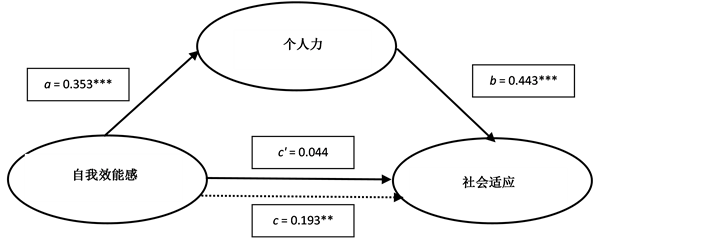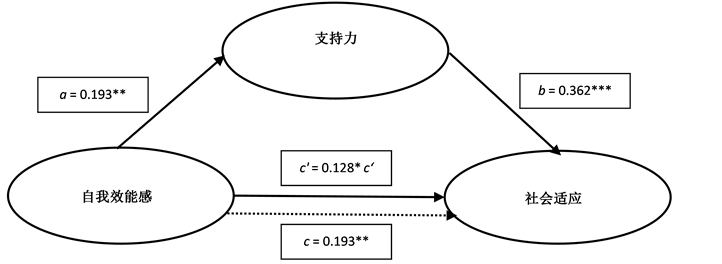1. 引言
目前关于“留守”现象的研究多数是针对未成年留守儿童,并广泛地认为不良环境必定会导致留守儿童心理健康水平和今后成就水平要低于正常环境下成长的儿童。然而,有研究指出,个人留守经历产生的最终评价指标反映在其成年后的社会适应水平。由于留守儿童数目的渐渐增多,社会逐渐开始探讨“留守经历”对个体产生的影响。温义媛和曾建国(2010)指出,大多数有留守经历的大学生存在不同程度的心理问题。而社会适应是衡量大学生心理健康的重要因素之一。因此,本文试图通过对大学生社会适应能力入手,揭示留守经验对个体成长的影响。
“留守经历”是指:在个体未成年阶段(≤16周岁),父母曾离开自己到外地务工,自己留守在家乡,由他人来照顾(李晓敏,等,2009)。研究发现,对比无留守经历的大学生,留守经历大学生的人际交往较为被动、自尊水平较低、应对方式偏消极;此外,温义媛和曾建国(2012)还发现留守经历大学生的社会支持偏低。而早年的留守经历对个体人格形成也有重要的影响(陈孜,等,2012)。言而总之,留守经历对个体来说是一种较为错综复杂的创伤,对其心理健康水平会造成较大的影响。
心理韧性是指个体以往或目前正在面对不利于身心健康发展的困境或承受巨大的压力,却未受到破坏性影响,甚至呈现越发坚强的趋势(Rutter, 2000)。研究表示,心理韧性对已经历逆境或正身处逆境个体的身心发展起着保护作用(李海垒,张文新,2006)。也有文章指出,留守经历无益于大学生心理韧性的健康发展(杨雪岭,冯现刚,崔梓天,2014)。随着国内外对心理韧性的不断深入研究,揭示了心理韧性在留守经历与个体发展中间起着重要作用。此外,王勤勤(2013)研究表明,大学生心理韧性发展水平能显著地正向预测其在学校社会适应的情况。如果把大学作为进入社会的最后一个缓冲带,那么留守经历大学生在校时段发展的种种能力与其学校适应的情况值得进一步深入探讨。
社会适应是指个体致力于在社会中良好地生存,在行为、生理和心理等方面做出适应性的调整和改变,从而与社会环境达到融洽状态。张译允(2010)和李保娜(2008)研究发现,自我效能感影响着个体的社会适应,两者存在显著正相关,且自我效能感对社会适应能力有很好的预期作用。有研究者指出心理韧性的探究自发轫至今已呈现了许多可供遵循的研究方向,站在积极心理学角度来说,主要方向是提升心理韧性,减少心理问题产生的概率,从而保持心理的健康,帮助个体更好地融入社会。而留守经历大学生的良好适应恰好可以达到这一目的。那么,自我效能感和心理韧性具体是如何对留守经历大学生的社会适应产生影响值得探究。
自我效能感是指个体对自己完成某方面工作能力的主观评估。陈建文(2001)研究指出自我效能感对社会适应有正向的预测作用,即表明个体的自我效能感水平越高,那么其社会适应表现越好。国外学者指出自我效能感与心理韧性的生成联系较为紧密(Deb & Arora, 2008), Bossick (2008)指出增强自我效能感有助于心理韧性的良好发展。此外,有关对留守经历大学生的调查研究也表明一般自我效能感高的有留守经历大学生,其心理韧性发展也会较好,且也有研究表明心理韧性对社会适应能力起着正向预测作用(王燕秋,等,2010)。基于以上内容,提出研究假设:1) 自我效能感与心理韧性正相关;2) 社会适应能力与自我效能感和心理韧性存在显著正相关;3) 在自我效能感与社会适应的关系中心理韧性起着中介作用。
2. 方法
2.1. 被试
本研究选取湖南省某高校大学生共发放问卷400份,得到有效问卷379份,剔除无留守经历大学生的问卷后,得到最终有效问卷292份,被试年龄在17~22岁之间。其中男性145人,女性147人;大一62人,大二116人,大三48人,大四66人。具体被试分布情况见表1。
2.2. 研究工具
2.2.1. 一般自我效能感量表(GSES)
该量表采用的是王才康等人(2001)修订成的中文版本。总共10个项目,使用4点计分方式,区间为10~40分,分数越高说明自我效能感也越高。该版本量表的内部一致性信系数为0.87。本次测量中得出的Cronbach α系数为0.748。

Table 1. Distribution chart of subjects
表1. 被试分布情况表
2.2.2. 社会适应能力诊断量表(SADS)
该量表是由郑日昌等人编制的,共20个项目,总分越高代表社会适应能力越强(宋专茂,2001)。其计分方式:单数号题,(1, 3, 5, 7, ···), A:−2分,B:0分,C:2分;双数号题计分则反之。将各题的分数依次相加,得到总分。该量表的内部一致性系数为0.701。本次测量得出的内部一致性系数为0.772。
2.2.3. 青少年韧性量表(HKRA)
该量表共计27个项目,分为支持力、个人力两个分量表。支持力由家庭支持、人际协助2个方面组成。个人力由目标专注、情绪控制和积极认知3个方面组成(胡月琴,甘怡群,2008)。5点评分(从完全不符合到完全符合)。得分越高,表明相关心理韧性的水平越高。量表内部一致性系数为0.83。心理韧性总分与各因子的相关系数为0.53~0.73。本次测量得出的内部一致性系数为0.756。
2.3. 施测与数据处理
采用随机抽样的方式选取大学生被试,对他们采取团体施测。测试前,主试通过指导语告知注意事项,强调保密措施,鼓励如实作答。测验完毕,主试剔除无效问卷,数据处理运用SPSS21.0软件。
3. 结果
3.1. 自我效能感、心理韧性、社会适应能力在性别、年级上的差异
由表2可知有留守经历的大学生在自我效能与心理韧性上均存在着显著的性别差异,在社会适应能力方面不存在显著的性别差异。心理韧性中的两个因素中,女性的支持力显著比男性高,而在个人力方面不存在显著的性别差异。在自我效能感方面女性显著低于男性。
有留守经历大学生在自我效能感、社会适应能力与心理韧性方面均存在显著的年级差异。事后检验结果表明,大四学生自我效能感显著高于大二学生;在社会适应能力、个人力和支持力方面大二与大四学生显著高于大一学生;心理韧性方面大一学生显著低于大二、大三与大四学生。
3.2. 自我效能感、心理韧性、社会适应能力的关系
从表3可以看出:1)自我效能感与心理韧性、个人力、支持力和社会适应能力均呈显著正相关;2)社会适应能力与心理韧性、个人力、支持力和自我效能感均存在显著正相关。

Table 2. Differences in gender and grade of social adaptation, self-efficacy and Psychological Resilience
表2. 自我效能感、心理韧性、社会适应能力在性别、年级方面上的差异(M ± SD)
注:*示意p < 0.05,**示意p < 0.01,***示意p < 0.001,下同。
3.3. 心理韧性的中介效应检验
3.3.1. 个人力的中介效应检验
采用温忠麟、张雷等人(2004)中介效应检验程序(三步骤检验模型)对有留守经历大学生的个人力在自我效能感和社会适应中间发挥的作用进行检验。其中X表示自变量自我效能感,Y表示因变量社会适应,M表示中介变量个人力。具体步骤是:1) 求社会适应能力(Y)在自我效能感(X)上的回归;2) 求个人力(M)在自我效能感(X)上的回归;3) 求社会适应(Y)在自我效能感(X)和个人力(M)上的回归。
由表4可知,中介效应检验结果显示,第一个回归方程中自我效能感对社会适应有显著的正向预测作用(c = 0.193, p < 0.01);在第二个回归方程中,自我效能感对心理韧性发挥正向预测作用(a = 0.353, p < 0.001);在第三个回归方程中,心理韧性对社会适应有正向预测作用(b = 0.443, p < 0.001)。在控制个人力对社会适应作用的基础上,自我效能感对社会适应无显著的预测作用(c' = 0.044, p > 0.05),c'不显著,说明是完全中介过程,即具有留守经历大学生心理韧性中的个人力在自我效能感和社会适应中间发挥着完全中介的作用,见图1。

Table 3. Correlation of Psychological Resilience, self-efficacy and social adaptation ability
表3. 自我效能感、心理韧性、社会适应能力的相关

Table 4. Mediation analysis of the individual power
表4. 个人力中介效应检验

Figure 1. Mediating effect model of the individual power on self efficacy and social adaptation
图1. 个人力在自我效能感与社会适应间的中介效应模型
3.3.2. 支持力的中介效应检验
由表5可知,中介效应检验结果表明,在第一个回归方程中,自我效能感对社会适应有显著的正向预测作用(c = 0.193, p < 0.01);在第二个回归方程中,自我效能感对支持力有显著的正向预测作用(a = 0.193, p < 0.01);而在第三个回归方程中,大学生的支持力对社会适应存在正向预测作用(b = 0.362, p < 0.001)。在排除支持力对社会适应产生作用的基础上,自我效能感对社会适应仍然有显著的预测作用(c' = 0.128, P < 0.05),c'显著,说明留守经历大学生的支持力在自我效能感和社会适应中间发挥着部分中介作用,其中介效应占总效应的比例为:ab/c = 36.20%,见图2。
4. 讨论
4.1. 留守经历大学生自我效能感、心理韧性的性别和年级差异
留守经历大学生在心理韧性方面女性显著比男性高,而在自我效能感方面男性显著高于女性。这可能是因为女性倾向于主动寻求和获得情感支持,社会支持系统较为稳固,心理韧性较强。此外,基于社会的期望,父母在培养和教育孩子过程中也会出现区别对待。对于女性,总是视其为弱者,小心保护,从而会导致女性依赖心理强,面对困难手足无措,自我效能感较低;而男性从小被要求独立,社会支持系统较为单一、不稳固,从而心理韧性会比较弱。相反,家庭与社会对其均寄予较高的期望,更好地培养他们独挡一面的能力,有更多的机会接受挑战、克服困难,因此拥有较高地自我效能感。
不同年级的留守经历大学生在自我效能感、心理韧性和社会适应上均存在极其显著的差异。由结果可知:留守经历大学生在自我效能感、心理韧性和社会适应三方面总趋势上高年级的同学显著高于低年级的同学。这可能是因为随着年级升高,留守经历大学生的知识储备增多,参加的社会实践变多,社会阅历也越丰富,应对方式越发灵活,自我认识更加全面。从而导致高年级留守经历大学生自我效能感、

Table 5. Mediation analysis of the supportive power
表5. 支持力中介效应检验

Figure 2. Mediating effect model of the supportive power on self efficacy and social adaptation
图2. 支持力在自我效能感与社会适应间的中介效应模型
心理韧性和社会适应能力均较强。结果还发现,留守经历大学生在自我效能上大二略低于大一,在心理韧性上大三略低于大一,尽管并未出现统计学上的显著性差异,但仍值得注意,作者认为可能是样本量的关系,所以在今后的研究中还需要进一步扩充样本量,以确保结果的稳定性。此外,大部分的大学生已经成年且年龄相近,人格发展相对成熟,心理发展水平趋于稳定,所以在年级方面未表现出绝对的规律性变化。
4.2. 留守经历大学生自我效能感、心理韧性、社会适应能力的关系
留守经历大学生自我效能感与社会适应能力呈显著正相关,并且可以显著地正向预测社会适应。这与张译允(2010)的研究发现一致。留守经历大学生较高的自我效能感能帮助他们有策略地应对周遭环境的改变,在面临情感分离等情境时,体验到较少的焦虑或抑郁等消极情绪,从而维持身心平衡,积极地去适应学校和社会环境。此外,较高的自我效能感帮助他们增强自信,做事情也会越有效率,能获得更多积极地评价,创造更好地人际关系,更好的适应生活环境。
留守经历大学生心理韧性与社会适应能力呈显著正相关,且能显著地正向预测社会适应。这与王勤勤(2013)的研究发现一致。留守经历大学生心理韧性发展好,主要是因为个人力和支持力两个因素起着重要的作用。留守经历为大学生成长提供了相对的困境,在该环境下孩子容易培养出较强的独立能力和自立意识,能恰当的控制好自己的情绪,缓解父母不在身边的不安,而对父母的外出务工产生较为积极的认知;此外心理韧性的支持力因素也发挥着重要的作用,父母不在身边,孩子会更多的寻求其他重要社会支持,当他们在生活或学习上遇到困难和紧急情况时,除了抚养人的关怀,还有来自师长同伴的鼓励和支持,帮助他们更好地适应生活。
一般自我效能感与心理韧性及其两个因子间也显著正相关。这与胡会丽(2009)的研究发现一致。一般自我效能感是个体对自己“能做什么”的一种认知。因而自我越是认可这种能力,那么他在面对困境时也会更加镇定自若,更加懂得如何调整自己的状态,去解决问题,减小情境给自己带来的压力,减小各种不良事件对自己造成的伤害,从而提高自己的心理韧性。心理韧性主要的作用机制是结合个体自身拥有的良好品质和外界的环境资源,缓解消极的应激反应,帮助个体积极地面对挫折和战胜逆境。而自我效能感正是留守经历大学生的积极品质之一,较高的自我效能感能帮助个体更好的面对挫折和逆境,帮助留守经历大学生积极的调控自我、整合自我、不断深入认识自我。综上,自我效能感与心理韧性之间相互促进。
4.3. 留守经历大学生心理韧性中介作用的分析
4.3.1. 心理韧性个人力的中介作用
心理韧性个人力在留守经历大学生自我效能感和社会适应能力两者间起着完全中介作用。个人力主要分为个体的目标专注、情绪控制和积极认知三方面,因此它是一种稳定的内在特质。这表明留守经历虽然是他们成长过程的负性事件,但是这能让他们更早明白生活的不易,理解父母外出的辛劳。留守经历也会令他们更早独立,形成坚韧的品质,对于消极的情绪有更强的控制能力,当然也会让他们更加珍惜眼前的生活,树立目标,专心致志的朝自己的目标努力。自我效能感较高的留守经历大学生更容易使自己积极适应社会,但社会适应是较复杂的,主要是心理与环境达到平衡。社会适应包括行为适应、心理适应和人格适应,而这几方面的良好表现又需要留守经历大学生的对目标关注力强、对情绪的良好把控以及个体积极的认知方式来实现,才能将自我的效能转变为适应社会的行为或能力。高自我效能感的留守经历大学生,其个人力中较强的目标专注、较好的情绪控制和积极认知方式,会成为社会适应的保护性因子来确保他们积极地适应逆境。
4.3.2. 心理韧性支持力的中介作用
留守经历大学生的支持力在社会适应能力和自我效能感中间发挥部分中介作用。支持力分为家庭支持和人际协助两个方面,结果表明自我效能感其中一部分是通过支持力对社会适应产生间接影响。父母不在身边,固然会让他们感到失落,但是父母或者身边其他的人若能给予一定的关爱和支持,他们会被感鼓励,更加自信,在人际交往过程中收获较多积极和成功的体验。支持力在个体内部自我效能感和外部的社会适应中扮演者重要的媒介作用,帮助潜在的自我效能转变成实用的社会适应行为。所以留守经历大学生若能得到的支持越多,社会适应情况会更好,而若他们具备较高的自我效能感,也会帮助他们获得更多的支持,更好地适应社会。
5. 结论
1) 自我效能感在性别与年级方面存在明显差异。
2) 社会适应能力在性别和年级方面有显著差异。
3) 心理韧性在性别与年级方面均有显著差异。其中支持力在性别与年级方面均有显著差异;个人力在年级方面有显著差异。
4) 自我效能感与社会适应能力、心理韧性显著正相关;心理韧性与社会适应能力也显著正相关。
5) 心理韧性的个人力在自我效能感与社会适应能力的关系中起着完全中介作用。
6) 心理韧性的支持力在自我效能感与社会适应能力的关系中起着部分中介作用。
附录

Table 1. General Self-Efficacy Scale
表1. 一般自我效能感量表

Table 2. The psychological resilience of adolescents
表2. 青少年心理韧性量
表3. 社会适应能力量表
期刊投稿者将享受如下服务:
1.投稿前咨询服务 (QQ、微信、邮箱皆可)
2.为您匹配最合适的期刊
3.24小时以内解答您的所有疑问
4.友好的在线投稿界面
5.专业的同行评审
6.知网检索
7.全网络覆盖式推广您的研究
投稿请点击: http://www.hanspub.org/Submission.aspx
期刊邮箱:ap@hanspub.org